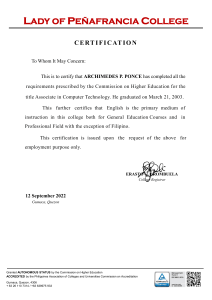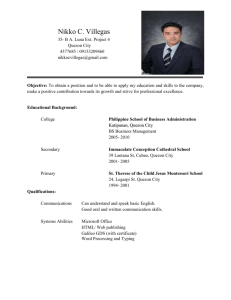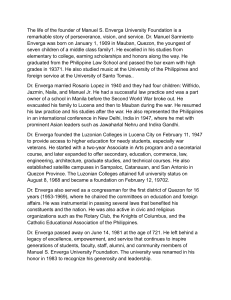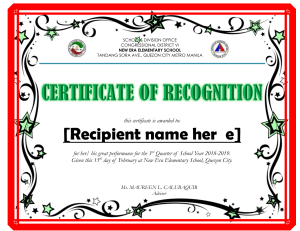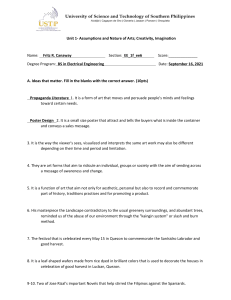Manuel Quezon Biography: Philippine President & Code of Ethics
advertisement
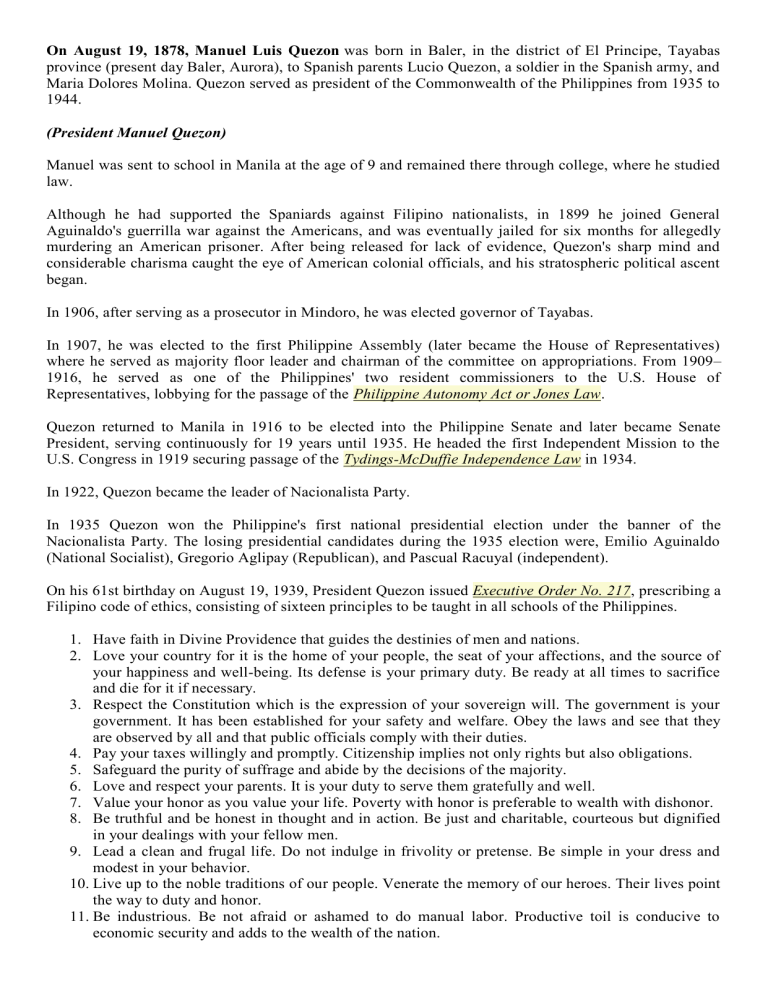
On August 19, 1878, Manuel Luis Quezon was born in Baler, in the district of El Principe, Tayabas province (present day Baler, Aurora), to Spanish parents Lucio Quezon, a soldier in the Spanish army, and Maria Dolores Molina. Quezon served as president of the Commonwealth of the Philippines from 1935 to 1944. (President Manuel Quezon) Manuel was sent to school in Manila at the age of 9 and remained there through college, where he studied law. Although he had supported the Spaniards against Filipino nationalists, in 1899 he joined General Aguinaldo's guerrilla war against the Americans, and was eventually jailed for six months for allegedly murdering an American prisoner. After being released for lack of evidence, Quezon's sharp mind and considerable charisma caught the eye of American colonial officials, and his stratospheric political ascent began. In 1906, after serving as a prosecutor in Mindoro, he was elected governor of Tayabas. In 1907, he was elected to the first Philippine Assembly (later became the House of Representatives) where he served as majority floor leader and chairman of the committee on appropriations. From 1909– 1916, he served as one of the Philippines' two resident commissioners to the U.S. House of Representatives, lobbying for the passage of the Philippine Autonomy Act or Jones Law. Quezon returned to Manila in 1916 to be elected into the Philippine Senate and later became Senate President, serving continuously for 19 years until 1935. He headed the first Independent Mission to the U.S. Congress in 1919 securing passage of the Tydings-McDuffie Independence Law in 1934. In 1922, Quezon became the leader of Nacionalista Party. In 1935 Quezon won the Philippine's first national presidential election under the banner of the Nacionalista Party. The losing presidential candidates during the 1935 election were, Emilio Aguinaldo (National Socialist), Gregorio Aglipay (Republican), and Pascual Racuyal (independent). On his 61st birthday on August 19, 1939, President Quezon issued Executive Order No. 217, prescribing a Filipino code of ethics, consisting of sixteen principles to be taught in all schools of the Philippines. 1. Have faith in Divine Providence that guides the destinies of men and nations. 2. Love your country for it is the home of your people, the seat of your affections, and the source of your happiness and well-being. Its defense is your primary duty. Be ready at all times to sacrifice and die for it if necessary. 3. Respect the Constitution which is the expression of your sovereign will. The government is your government. It has been established for your safety and welfare. Obey the laws and see that they are observed by all and that public officials comply with their duties. 4. Pay your taxes willingly and promptly. Citizenship implies not only rights but also obligations. 5. Safeguard the purity of suffrage and abide by the decisions of the majority. 6. Love and respect your parents. It is your duty to serve them gratefully and well. 7. Value your honor as you value your life. Poverty with honor is preferable to wealth with dishonor. 8. Be truthful and be honest in thought and in action. Be just and charitable, courteous but dignified in your dealings with your fellow men. 9. Lead a clean and frugal life. Do not indulge in frivolity or pretense. Be simple in your dress and modest in your behavior. 10. Live up to the noble traditions of our people. Venerate the memory of our heroes. Their lives point the way to duty and honor. 11. Be industrious. Be not afraid or ashamed to do manual labor. Productive toil is conducive to economic security and adds to the wealth of the nation. 12. Rely on your own efforts for your progress and happiness. Be not easily discouraged. Persevere in the pursuit of your legitimate ambitions. 13. Do your work cheerfully, thoroughly, and well. Work badly done is worse than work undone. Do not leave for tomorrow what you can do today. 14. Contribute to the welfare of your community and promote social justice. You do not live for yourselves and your families alone. You are a part of society to which you owe definite responsibilities. 15. Cultivate the habit of using goods made in the Philippines. Patronize the products and trades of your countrymen. 16. Use and develop our natural resources and conservation for posterity. They are the inalienable heritage of our people. Do not traffic with your citizenship. After the Japanese invasion of the Philippines during World War II he evacuated to Corregidor, then the Visayas and Mindanao, and upon the invitation of the US government, was further evacuated to Australia and then to the United States, where he established the Commonwealth government in exile with headquarters in Washington, D.C.. During his exile in the US, Manuel Luis Quezon died of tuberculosis in Saranac Lake, New York on August 1, 1944. spirit of the youth in constantly instil in the minds and hearts of their students their duty to defend the nation in time of war and to be useful and law –abiding citizens in time of peace. true worth of a man is measured not only by a diploma but by his proficiency in his chosen line of work” Quezon – Intellectually-gifted – should have ambition to follo vocational training to make them economically self-sufficient. thy citizen first learns his duties before speaking his demands the citizen a slave and granted the right to vote, for it was their duty also to choose a leader that would lead their country well. option of Tagalog as the basis for the Philippine national language since it was the most developed of all existing language in the country and most widely spoken language in his 19. BUILDING THE FILIP every citizen recognizes the rights of his fellowmen, and in turn makes in fellowmen recognize his own rights” Self Ineff but not the Filipinos didn’t realize that they must work for their self and not to defend on government, work hard and be dignified on what ever field of career you have. code, a code for ethics, personal conduct that sh written Bushido that “can be explained in the schools, preached from the pulpits, and taught in the streets and plazas, and in the remotest corners of our land” his code is incorporated in Executive Order No. 217 1. Have faith I God who guides the destinies of men and nations 2. Love, defend and be ready to sacrifice yourself for your country 3. Respect the constitution and the government which established for your safety and welfare, and obey its laws 4. Pay your taxes willingly and promptly 5. Safeguard the sanctity of ballot and abide by the rule of majority 6. Love and respect your parents 23. 7. Value your honor as you value your life 8. Be truthful, honest, just, charitable, courteous and dignified on your actions 9. Lead a clean and frugal life 10. Live up to the noble traditions of our heroes 11. Be industrious and value the dignity of labor 12. Be self-reliant and presevere in pursuing your legitimate ambitions 13. Love you work and do not do for tomorrow what you can do today 14. Promote social justice 15. Patronize Philippine-made products 16. Use and develop wisely our natural resources and do not allow your citizenship to be exploited by others Manuel Quezon was born on Aug. 19, 1878, to Lucio Quezon and Maria Molina, both schoolteachers, in Baler, Tayabas (now Quezon) Province, in Luzon. Manuel enrolled at San Juan de Letran College, after which he was appointed lecturer at the University of Santo Tomás. There he studied law, but his studies were interrupted by the outbreak of the Spanish-American War. Quezon was considered "bright but lazy"; but when he joined the revolutionary forces of Gen. Emilio Aguinaldo during the revolution against Spain, Quezon displayed his fearless, bold, and quick-tempered style of fighting. He was promoted from private to major until, in 1899, he surrendered to the Americans, spent 6 months in jail, and then returned to Manila. Summary Quezon’s philosophy of education is essentially local or Philippine in orientation. It is a reflection of the need of a colonial people to upgrade themselves intellectually, morally, and economically through the process of education. It is one of the most important Filipino educational philosophies during the American colonial period. According to Quezon, there are two objectives of Philippine education: (1) education for better citizenship, and (2) education as means of livelihood. Quezon stressed that the good of the state is paramount to the good of the individual. The state has the duty to mold the spirit of the youth in patriotism and self-sacrifice which can be done through education. Quezon had envisioned a complete and adequate system of public instruction. He stressed compulsory education in a free public primary education and in citizenship training for adults. He also believed in government scholarships in all branches of learning, and in vocational and agricultural training in intermediate and high schools. For higher education, Quezon believed that only those intellectually capable must go through a college or university education. The average student should be encouraged to pursue vocational education. MANILA, Philippines – Seventy-five years ago today, President Manuel L. Quezon addressed the nation in Filipino via radio. It was the first time that a President spoke on air using Filipino, which was declared the Philippines’ national language by virtue of Executive Order No. 134 issued on December 30, 1937. Quezon said in the radio broadcast: “Nagdudulot sa akin ng di matingkalang kasiyahan na maipahayag ko sa inyo na ngayong ika -41 anibersaryo ng pagmamartir ng nagtatag at pinakadakilang tagapamansag ng nasyonalismong Pilipino, ay naging karangalan kong ilagda, bilang pag-alinsunod sa utos ng Konstitusyon at ng umiiral na batas, ang isang Kautusang Tagapagpaganap na nagtatalaga sa isa sa mga katutubong wika na maging batayan ng wikang pambansa ng bayang Pilipino.” Quezon echoed the recommendation of the National Language Institute (NLI) to adopt Tagalog as the foundation of the national language of the country. The NLI was mandated to conduct studies on various native tongues with the purpose of evolving and adopting a national language based on one of these dialects. Explaining the result of their studies, the language experts who comprised the NLI stated in a resolution they passed on November 9, 1937: “This conclusion represents not only the conviction of the members of the Institute but also the opinion of Filipino scholars and patriots of divergent origin and varied education and tendencies who are unanimously in favor of the selection of Tagalog as the basis of the national language as it has been found to be used and accepted by the greatest number of Filipinos not to mention the categorical views expressed by local newspapers, publications, and individual writers.” The NLI was headed by Jaime de Veyra (Samar-Leyte Visayan) with the following members: Santiago A. Fonacier (Ilocano), Filemon Sotto (Cebu Visayan), Casimero Perfecto (Bicol), Felix S. Salas Rodriguez (Panay Visayan), Hadji Butu (Moro), and Cecilio Lopez (Tagalog). Advances in use of Filipino Fast forward to December 30, 2012, the President also addressed the nation in Filipino, but in a Youtube video, reflecting how communication technology has evolved since the declaration of the national language 75 years ago. In his message, President Benigno Aquino III urged the country to take pride in using the Filipino language as a historical heritage and a medium of unity. “Paano hahabiin ang pagkakaisa sa kabila ng mga pagkakaiba? Paano pag-aalabin ang malasakit sa kapwa’t sa bandila? Nawa’y maging mas masigasig ang ating pakikisagwan sa iisang direksyon upang maging ganap ang potensyal ng ating Wikang Pambansa,” Aquino said. “Sa liwanag ng katotohanan at katapatang ipinababatid ng ating wika, at ng katangi -tanging pamana ni Rizal, tumitingkad ang ating pagkakaisa, lumalakas ang ating tinig at pagkakapit-bisig tungo sa pag-abot ng ating mga mithiin,” Aquino added. According to communications undersecretary Manuel Quezon III, the present generation of Filipinos has witnessed “advances in the use of the national language,” citing the use of Filipino during the State of the Nation Addresses in 2010, 2011, and 2012. Aquino however said that the challenge to develop the full potential of the language remained.
